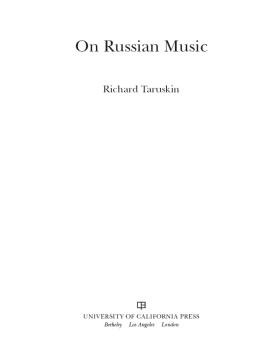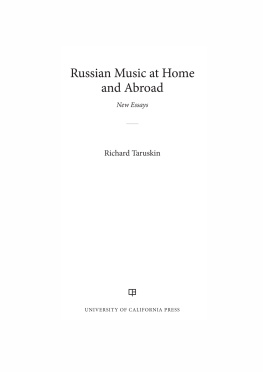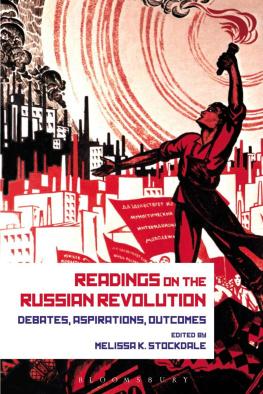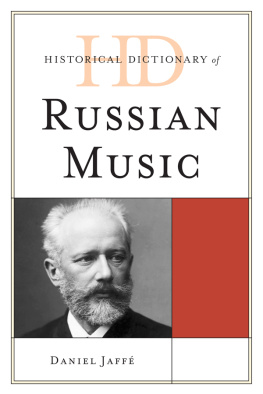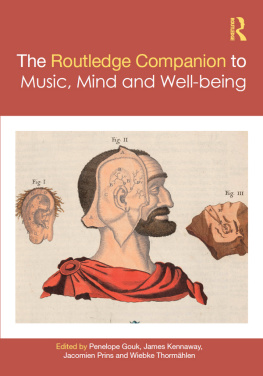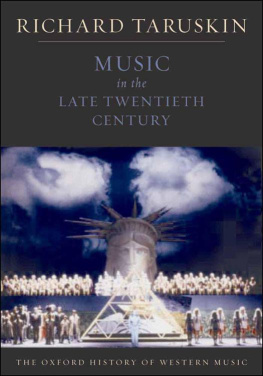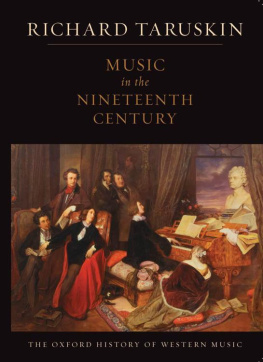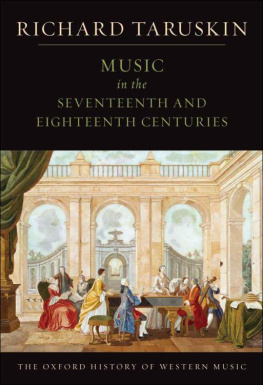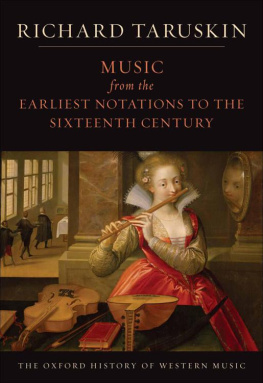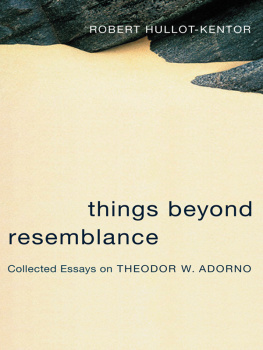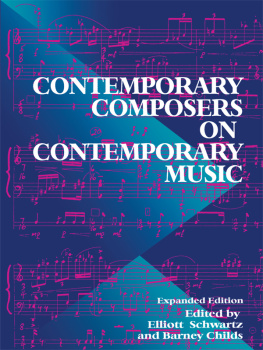On Russian Music
The publisher gratefully acknowledges the generous
contribution to this book provided by the Ahmanson
Foundation Humanities Endowment Fund of the
University of California Press Foundation.
On Russian Music
Richard Taruskin

University of California Press, one of the most distinguished university presses in the United States, enriches lives around the world by advancing scholarship in the humanities, social sciences, and natural sciences. Its activities are supported by the UG Press Foundation and by philanthropic contributions from individuals and institutions. For more information, visit www.ucpress.edu.
University of California Press
Berkeley and Los Angeles, California
University of California Press, Ltd.
London, England
2009 by The Regents of the University of California
Library of Congress Cataloging-in-Publication Data
Taruskin, Richard.
On Russian music / Richard Taruskin.
p. cm.(Ahmanson Foundation humanities endowment fund imprint)
Includes bibliographical references and index.
ISBN 978-0-520-24979-0 (cloth : alk. paper)
1. Musical criticism. 2. MusicRussiaHistory and criticism.
I. Title.
ML300.T38 2009
780.947dc22 2007052243
Manufactured in the United States of America
18 17 16 15 14 13 12 11 10 09
10 9 8 7 6 5 4 3 2 1
This book is printed on Natures Book, which contains 50% post-consumer waste and meets the minimum requirements of ANSI/NISO Z39.48-1992 (R 1997) (Permanence of Paper).
To Lenochka, Lorochka, Milochka, Ritochka,
and especially to
Malcolm Hamrickovich on his jubilee
CONTENTS
1. Some Thoughts on the History and Historiography
of Russian Music
6. Pathetic Symphonist: Chaikovsky, Russia, Sexuality,
and the Study of Music
7. Chaikovsky and the Literary Folk: A Study in
Misplaced Derision
Introduction
Taking It Personally
This book shares its title with another. Its namesake, Gerald Abrahams On Russian Music: Critical and Historical Studies of Glinkas Operas, Balakirevs Works, etc., with chapters dealing with Compositions by Borodin, Rimsky-Korsakov, Tchaikovsky, Mussorgsky, Glazunov, and various other aspects of Russian Music, was published in 1939 and has been a foundational part of my personal musical consciousness since about 1958, when as a high-school student I began to frequent the New York Public Librarys circulating music branch (then located on East 58th Street in Manhattan) in hopes of slaking what was becoming a tormenting thirst to learn, and learn about, every composers every composition.
Abrahams book was like this one in two distinct ways. It covered a lot of the same ground. Here too one will find mention of Glinka, Balakirev, Borodin, Rimsky-Korsakov, Tchaikovsky (here spelled Chaikovsky in keeping with a personal quirk of the present author, who cannot abide reminders of the former dependent status of Anglophone musicography on that of the continent; if were past Tchekhov, why not get past Tchaikovsky?), Mussorgsky (spelled Musorgsky in accordance with the Russian orthography; the Englishor is it just American?word busing, once a battle cry in Boston, refutes the alleged spelling rule that mandated the double s), and Glazunov, though there is as much or more here about Prokofieff (spelled that way, like Rachmaninoff, because that is how the composer spelled it during his years abroad), Shostakovich, and their contemporariescomposers who (but for a single contribution to the Allied war effort, a 1943 booklet called Eight Soviet Composers) never interested Abraham, for reasons, then widely shared, that are well spelled out in the one exceptional book.
The other way in which my book resembles Abrahams is in the fact that they both consist of recycled material: articles previously published in
Already some of the reasons should be apparent why Gerald Abraham was for me such a powerful inspiration, role model, and target of emulation. His lifetime output of books authored and edited, articles and essays, dictionary and encyclopedia entries, editions of music, and ephemerae totaled upward of 250 items, and quantitative measures, any honest author is bound to admit, do provide a spur, the more so since I was not nearly as precocious a musicographer, having been sidetracked by early and intense interests in both composition and performance. But Abrahams prolificacy was really (really!) the least of it. Two other attributes counted for more.
The first was, after all, the cause of his prolificacynamely, his powerful sense of purpose. When he discovered Russian music at the age of twenty, there was practically no literature in English on the subject, and what little there was, chiefly by Montagu Montagu-Nathan and Rosa Newmarch, was riddled with errors.Calvocoressi: Masters of Russian Music in 1935; and, posthumously, in 1946, the Master Musicians volume Mussorgsky. In his obituary Brian Trowell is perhaps a bit mischievously frank, though no doubt accurate, in his assessment of the young Abrahams motives:
The discovery of Borodins music, which was to become the subject of his first book four years later, sparked off his lifelong admiration for Russian composers. It came at the right time: he knew that as a young writer, with a reputation to make, he would need to find some special area of expertise.
Not that there is any necessary contradiction between such calculation and sincere devotion to a field. I know this introspectively, my own career having recapitulated the Abraham scenario in almost improbable detail. True, my family background might be thought to have predisposed me to an interest in Russian music; but in fact my path to it was circuitous, and calculated to a degree that may strike the reader as downright cynical.
As I explain in greater detail in , my ancestry goes back to Russia geographically but not ethnically. Most of the relatives I knew as a child had been born in Russia, but I never heard Russian being spoken around me. The mother tongue of my Russian-born grandparents, great aunts, and great uncles was Yiddishtwo different Yiddishes, in fact, reflecting the broad geographical dispersion of the Jewish pale of settlement on the fringes of the Russian empire. My fathers family hailed from the town of Dvinsk (now Daugavpils in Latvia), the birthplace, as I found out much later, of Mark Rothko. Their Yiddish was northern, or Litvak (Lithuanian). My mothers family was from Yekaterinoslav (now Dnepropetrovsk, Ukraine), the birthplace, as it happens, of a number of famous musicians, including Gregor Piatigorsky and Leonid Kogan. Theirs was southern, or Galitsyaner (Galician), Yiddish. When my parents spoke Yiddish to each other (i.e., when they needed to keep a secret from my siblings and me) I could hear how their pronunciations differed (he said bruder for brother, she said brider; he said bucher for books, she said bicher; I was his zun, her zin), even if I did not understand what they were sayingand as soon as my sister and I did begin to understand, they stopped speaking Yiddish, as their parents had stopped speaking Russian. I once asked my fathers father straight out whether he could speak Russian. He said it was the tsars language and Jews used it only (to give it a contemporary paraphrase) when speaking to The Man.
That, of course, surrounded the language for me with an aura of mystery. It was the language of hostile power, a forbidden tongue, and I longed to hear what it sounded like. Once, when I was about seven, I asked a friend of one of my mothers many aunts, when we both were visiting in the latters house, to say something in Russian. She complied while stroking my cheek tenderly. I have no idea what it was she said, but Ill bet it was something like
Next page
